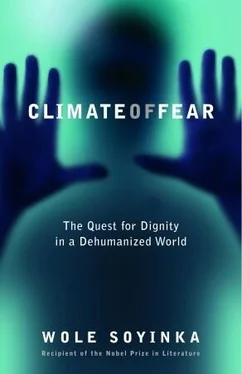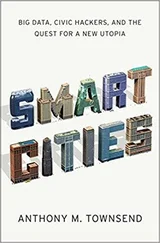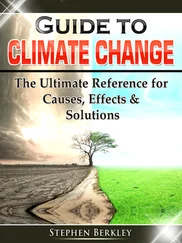Is it any surprise that the new purveyors of fear of our time have moved beyond submission to such rational scrutiny? They are not the student cafeteria crowd, or the Sunday-afternoon rhetoricians of Speakers’ Corner in London’s Hyde Park, who, after all, return home and redigest and debate what has been proposed. They are creatures not of uncertainty but of holy conviction, and they have demonstrated again and again that they consider their lives of value only when they expend them— not even incidentally, but in a deliberate act guaranteed to take the maximum toll on innocents — as the ultimate consummation of that conviction. Not for them the Buddhist route of a limited self-immolation as the ultimate statement, as was prevalent in South Korea under the reign of dictatorial incontinence. These belong to a most select, near-impenetrable community, from within whose ranks power, even posthumously, grows from the suicide bomb.
There are no innocents: this accentuation of the earlier rhetoric— All property is theft —which makes us all thieves since we claim life as property, however temporarily, is what marks the difference between the rhetorical hysteria that held the world in thrall in those fervid sixties and seventies, on the one hand, and the nature of what we are witnessing today. Combine those two limited shorthand rhetorical triggers and we move to the zone of the catechism that claims that All life is theft, and thus should be restored to its legitimate owner by any true believer, and as rapidly as possible. If only we could persuade the apostles of such gospels of the infinite justice of leaving such restoration to the personal intervention of the divine proprietor! Alas, they have constituted themselves agents of restitution, where innocents pay sudden forfeit, without even the consolation of seeking assurance of divine forgiveness for the lamentable lapse of living.
The question we must now confront is this: who or what are the principal agents of the season of rhetorical hysteria that now seek to bind and blind the world within our climate of fear?
We need a lot of objectivity, and a commitment to equitable dealing, in addressing this question. Fortunately — but what a costly piece of fortune! — the world has received a most exemplary piece of instruction in the devastating potential of the private addiction to a rhetorical condition that can spread and infect a whole nation. For this, we must thank the president of one of the most powerful nations of the world, the United States. For an intense period that began a year or more ago, our airwaves were bombarded with an entrapment piece of monologue of just four words— weapons of mass destruction. It was a sustained demonstration, both as metaphor and as prophecy, of how empty such rhetoric can prove, yet how effectively it can blind a people, lead them into a cul-de-sac, securing nearly an entire nation within a common purpose that proves wrongly premised. Outside that nation, more than a few others were swept up in the hysteria that was stimulated by no more than the simple but passionate evocation of that mantra, weapons of mass destruction. Predictably, it was only a matter of time before it acquired an acronym— WMD — either for ease of reference or perhaps as a relief for that uncooperative mantra that stubbornly refused to manifest its name. WMD aspired to the level of religious faith. Individuals who disputed its claimed reality found themselves subjected to abuse, sometimes of a violent nature. Both overtly and indirectly, unbeliever nations were either offered inducements or threatened with sanctions.
The hysteria that was inspired by that presidential monologue echoed, for many, the McCarthy period of anticommunist hysteria, when the mere failure to denounce the communist ideology with satisfactory fervor, or to denounce one’s colleagues for communist sympathies, became an unpatriotic act that was sometimes accounted treason. Thus came into being the damning tag unAmerican activities, to ferret out and punish which a standing committee was set up in the United States legislature.Was there any difference between that rhetorical device of the mid-fifties and that of the turn of this century? Certainly there has been continuity. To ensure that the nation co-option that fed on the rhetoric of “the enemy within” did not lack for nourishment, the decades between unAmerican activities and weapons of mass destruc tion were caulked with holding devices of the nature of “Evil Empire” and, latterly, “Axis of Evil.” The beauty of the political mantra has always been its ability to distill complex events and global relationships into a rhetorical broth that precludes digestion, but guarantees satisfaction.
Let no one underestimate the criminal immensity of September 11, 2001, that arrogant manifestation of the mantra There are no innocents, nor its hideous impact on global consciousness. The tasteless gloating of a handful of normally astute writers and intellectuals whose will to radicalism sometimes overpowers their humanism is only a measure of the pretentious detachment of some of us from the world we live in, and should not be permitted to cloud our individual revulsion over that event, any more than it should inhibit us from interrogating the choices of response that could be expected from the leadership of a stricken people. More than sufficient time has elapsed for objective consideration of the choices, with all due allowance also made for the fact that it was that space, not ours, that was most directly affected, most deeply traumatized, most deeply and forcibly injected with the virus of fear.
There were options, however, and the case is being made here that the leadership of that nation chose to substitute, for a hard assessment of its relationship with the rest of humanity, an emotive rhetoric that blinded it even further, driving that nation deeper into an isolationist monologue, even within the debating chambers of the United Nations. Afghanistan of the Taliban, sheltering and collaborating with the murderous quasi-state of al-Qaeda, had declared direct war on a people and thus richly deserved its comeuppance. However, the rhetorical momentum engendered since the monstrous date of September 11 has propelled the United States into an unjustifiable war in Iraq. A global wave of sympathy has been frittered away in a defiant unilateralism that appears to thrive on hysteria and deception. We have watched and listened in recent times to the unedifying acts and pronouncements of a nation that is not accustomed to being contradicted, deeming it a heresy on the part of any nation or world figure to balk at intoning the mantra of weapons of mass destruction.
Reprisals from the nation that draped its shoulders in a mantle of infallibility attained some bemusing dimensions. The greatest umbrage against the restraining community of skeptics was reserved for France, whose cultural penetration of the United States was more prolific in symbols of snobbishness than that of her partner in crime, the Federal Republic of Germany. Germany got off quite lightly. To the intense embarrassment of a substantial minority of Americans themselves, a number of restaurants that once proudly advertised themselves as French quickly changed their names or painted out the French tricolor designs outside their establishments. Nowhere is it recorded that any thought was given to the nation’s Canadian neighbor, which recognizes herself as bicultural. America’s lawmaking chambers took “French fries” off their cafeteria menu and renamed that item “Freedom fries.” The French baguette and croissants lost out to sourdough bread, bagels, and pretzels. Most incredible of all, many wineshops and bars threw out their stock of French wines, depleting their shelves as rapidly as they could by selling them at rock-bottom prices, where they were gleefully gobbled up by infidels to the gospel of WMD — among whom was most certainly a cash-strapped Nobelist who shall remain nameless. It was either you believed in weapons of mass destruction or you became overnight a pariah. It did not matter in the least that these WMD faithfuls understood that this was a dangerous religion that would not end in mere rhetoric but that guaranteed, from the very beginning, a denouement not simply of war, but of war-lust. The triumph of the monologue was supreme.
Читать дальше












